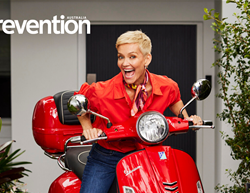I’VE BEEN playing tennis for the past seven years with a group of mothers I met at my son’s school. Our kids have headed off to uni, but we’re still hitting the courts two mornings a week. What makes these sessions enjoyable is that we play purely for fun. None of us is under any illusion that she’s going to become a late-in-life tennis sensation.
So the atmosphere is friendly. When one of us hits a smokin’ shot over the net, another will say, “Nice!” or “Wow, you are killing it today!” Then the player who smashed it will invariably answer, “I got lucky,” or, “Mercury must not be in retrograde.”
I never thought this was a problem until I read about a Japanese study showing that praise stimulates a part of the brain that makes learning easier, which in turn improves emotional health. Each commendation lands with a measurable effect – in fact, it stimulates the same area of the brain that receiving a cash award does. So when we deflect praise, my friends and I might be negatively affecting our otherwise healthy activity. If so, why bother getting up so early?
To find out how widespread the allergy to compliments is, I decided to conduct a very unscientific survey – and soon discovered that the tendency to demur is nearly universal.
We have many clever styles of dodging approval. Karina, a successful film producer, uses what I’ll call the “I’m rubber, you’re glue, whatever you say bounces off me and sticks to you” deflection when she’s on a date. If complimented on her appearance, she’ll answer, “Well, you’re not too bad yourself.”
A common tactic is to treat praise like the aftermath of an accident – you know, when the police show up and say, “Nothing to see here. Keep moving.” An example of Beth’s compliment repellent style: “You think the new website looks good? You probably haven’t read the articles I just added.”
Theories abound as to why women have trouble accepting, much less believing, a simple compliment. Maybe our humility is a relic from an era when being demure was a prized quality in women. Maybe it’s low self-esteem. Wherever it comes from, I decided to try to eradicate it. I challenged myself to graciously accept every compliment that came my way over the next week.
It was more difficult than I expected. A friend I ran into at a fancy luncheon told me I looked great. I couldn’t help but reply, “Sure, if you’re comparing me with survivors of a zombie apocalypse.” Another woman said she was a fan of my writing. My immediate reaction was to assume that she had me confused with someone else. But I managed a tentative “Thank you.”
Admittedly, there were two days when no one complimented me at all, and I had a minor breakdown when I failed to earn praise at the supermarket for my organised assemblage of groceries. The next day, however, while I was touching up my make-up at a red light, a guy pulled up and gave me a smile and a thumbs-up. I waved and mouthed, “Thanks!” It felt terrific.
At the end of the week, I was primed to enjoy any and all accolades at tennis. But I played worse than I ever had, whiffing on even the simplest of volleys. My plan was foiled but I had a back-up: I lavished praise on my teammates.
“You must’ve had a great cup of coffee today,” I said to Julie.”Good try!”
“It was four cups, but, uh, okay!” she replied.
I kept at it: “Great job, Karen. It was barely out.”
“I think it landed two courts over,” she replied. “But thanks!”
By the end of the hour, I’d either shifted my friends’ attitudes toward receiving compliments or worn them down. Either way, they’d begun responding with a simple “Thank you!” and there was an infectious esprit de corps among us.
Leaving the court, I felt like I’d gained back the centimetre or so in height I seem to have lost since turning 50. So I’m going to keep working on not only accepting compliments, but also being more generous both on and off the court. I definitely feel my spine elongate when I’m able to forgo my standard self-deprecating eye roll in favour of a confident thank-you when someone says something nice. And by handing out compliments, I’m helping my friends break the same habit. That feels pretty rich indeed.






